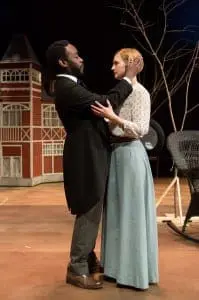Letters from the Rehearsal Room Part Six
Dear Audience-
At intermission of our Thursday night preview, I overheard a young man say “Chekhov is like an old time reality show.” I couldn’t agree more.
When I was a student, >recipe I had a professor who insisted to the point of zealotry that teaching plays as text destroyed the ability of students to appreciate them. While I’m not a complete convert—some plays read very well on the page—I do agree that often teaching dramatic literature with the text alone is a little bit like teaching architecture using only blueprints.
Reading Chekhov can be particularly challenging. Aside from the clear barriers of time, place, and language, Chekhov’s fascination with human behavior requires readers to constantly keep a running list of idiosyncrasies in their head. His famed use of subtext requires readers to pick up clues in dialogue about what’s going on inside character’s minds without the luxury of descriptive paragraphs and point-of-view narration that novels possess. Even the well-informed catch themselves saying “Now who is that? And they are secretly in love with whom? That guy? But they’ve never even had a scene together!” Boasting large ensembles, the plays can be tricky to navigate, especially for readers in search of a clear plot and story arc. The result? Chekhov has been written off by generations of high school students as ‘boring.’
This is where performance becomes necessary. It can be hard to find an emotional connection to the textual version of ‘Baron Tuzenbach,’ but it’s easy to feel for actor James Ijames as Tuzenbach when he covers his embarrassment over a friend’s bad behavior. On the page, Irina’s desire to work feels pseudo-Soviet (though Chekhov was writing before the Revolution). When playing Irina, however, Mary Tuomanen speaks with the naïveté of a recent college grad who thinks there’s an easy answer to her dissatisfaction with her life. There might be hints of the coming Revolution in her words, but when her speech is given an actor’s voice, Chekhov’s deep ambivalence about Irina’s solution emerges. On the page she seems certain, on the stage, it’s more complex.
It’s been a pleasure taking you inside the rehearsal room, and whether you are reading these before or after seeing the production, I hope you feel you’ve gotten a glimpse behind the curtain. Happy Opening Night!
Sincerely,
Sally Ollove

